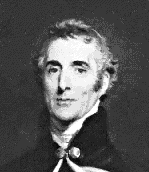 Arthur Wellesley, the first Duke of Wellington, was born in Dublin in 1769. He had little interest in education and in order to find something which "poor Arthur" could do, his parents purchased a commission for him in the British army in 1787. He served in Europe and in 1797 his regiment was sent to India where his brother became Governor General later that year. In India, Wellington saw active service until he returned home in 1805. He sat as an MP for Rye between 1806 and 1809, becoming Irish Secretary in 1807.
Arthur Wellesley, the first Duke of Wellington, was born in Dublin in 1769. He had little interest in education and in order to find something which "poor Arthur" could do, his parents purchased a commission for him in the British army in 1787. He served in Europe and in 1797 his regiment was sent to India where his brother became Governor General later that year. In India, Wellington saw active service until he returned home in 1805. He sat as an MP for Rye between 1806 and 1809, becoming Irish Secretary in 1807.
In 1809 he was sent to assume command in Portugal. Wellington gained military distinction in the Peninsular Campaigns during the French Wars, culminating in the victory at Waterloo. He was raised to the peerage as the Duke of Wellington in recognition of his achievements and he sat in the House of Lords for the rest of his life.
In 1818 Wellington joined the administration of Lord Liverpool as Master-General of the Ordnance; in 1827 he became Commander-in-Chief of the British Army, an office in which he was confirmed for life in 1842. Wellington led the Tories in the Lords and threw his weight behind most of the administrations between 1818 and his death in 1852.
In 1827 Wellington formed his first ministry and appointed Robert Peel as his Home Secretary and William Huskisson as President of the Board of Trade. The major pieces of legislation of his ministry were the repeal of the Test and Corporation Acts in 1828 and the passing of the Catholic Emancipation Act in 1829. Following these pieces of legislation, the political supremacy of the Church of England was broken.
Wellington had declared himself in favour of Catholic Emancipation as early as 1825 and, since he had many influential contacts in Ireland, he was well aware of the activities of Daniel O'Connell and the Catholic Association. It is difficult to explain why he provoked Huskisson into resigning over a modification of the Corn Laws in 1828, or why Wellington chose Vesey Fitzgerald to replace Huskisson. Fitzgerald had to stand for re-election in what was O'Connell's heartland. It might be that Wellington deliberately exacerbated the situation in 1828 in order to force parliament's hand over Catholic Emancipation.
Last modified April 1997
<